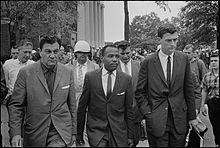NAFUSA President Richard Deane announced that John Doar, left, famed for his involvement in several of the most significant events of the civil rights movement, will be the keynote speaker at this year’s conference in Atlanta.
Doar served as first assistant and then assistant attorney general, Civil Rights Division, Department of Justice, from 1960 to 1967, the critical years of the civil rights movement. He also served as special counsel to the House of Representatives with respect to the impeachment of President Nixon and as counsel to the judicial investigation of a sitting federal judge, which ultimately led to his impeachment.
In 1962, Doar confronted Mississippi Governor Ross Barnett when the governor attempted to block James Meredith from entering the University of Mississippi. Doar is shown in the photo (right) with U.S. Marshals escorting Meredith to class.
He prosecuted and convicted Collie Leroy Wilkins for federal civil rights violations in the murder of Viola Liuzzo. In 1963, he confronted and calmed an angry mob after the murder of Medger Evers. “My name is John Doar, D-O-A-R,” he shouted. “I’m from the Justice Department, and anybody around here knows I stand for what is right.” He was also the prosecutor in the federal civil rights case against the accused murderers of Andrew Goodman, James Chaney and Michael Schwermer, the subject of the movie Mississippi Burning.

It was a scorching hot day in 1963, and Mississippi was on the verge of a massacre. The funeral procession for Medgar Evers had just disbanded, and a group of marchers was throwing rocks at a line of equally defiant and heavily-armed policemen. And suddenly, a white man in shirtsleeves, hands raised, walked towards the protestors and talked them into going home peacefully. And that man was John Doar. He was the face of the Justice Department in the South. He was proof that the federal government was listening. And over the years, John escorted James Meredith to the University of Mississippi. He walked alongside the Selma-to-Montgomery March. He laid the groundwork for the Civil Rights Act of 1964 and the Voting Rights Act of 1965. In the words of John Lewis, “He gave [civil rights workers] a reason not to give up on those in power.” And he did it by never giving up on them. And I think it’s fair to say that I might not be here had it not been for his work.
He is currently senior counsel to the New York firm of Doar Rieck Kaley & Mack. He is a graduate of the University of California at Berkeley Boalt Hall School of Law.

![john-doar[1]](https://nafusa.org/wp-content/uploads/2012/06/john-doar1.jpg)

You must be logged in to post a comment.